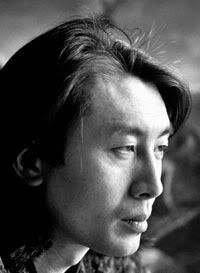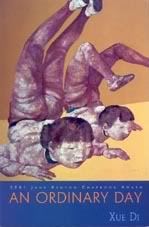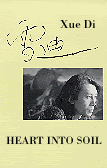Originally published in 2001 by Asian American Press, St. Paul, MN. Picture by John Foraste.

Interviewer's Introduction:Xue Di is a native of Beijing. After taking part in the demonstrations in Tian'anmen Square, he left China and became a fellow in Brown University's Freedom to Write program in 1990.
Xue Di has published several books of poems, contributed to many magazines, and is further known as an anthologist and critic. His books include Flames (paradigm press, 1995), Heart Into Soil (Burning Deck / Lost Roads), Circumstances (Duration, 2000) and An Ordinary Day (Alice James Books, 2001). This interview was conducted shortly after the release of An Ordinary Day.
AAP: Tell us a few things about your latest book An Ordinary Day. What are some of the major issues and themes you address with this book? Do you feel your style has changed any since your previous collection, Heart Into Soil?
XD: This book is about understanding of societies, the ones that we are part of but fighting and complaining about, building and re-building all the time. It is about understanding a journey of my inner life, covered by daily details and layers of emotion, a record of visioning outwards—in contrast to when I lived in a communist society and was visioning inwards—as I live in a free country. It is about understanding the connections and knots within a man in relation to societies and time.
The last eight poems in An Ordinary Day besides “Love in Difficulty” were written later than the poems in Heart Into Soil. They are tighter and jump more, poems break into many more stanzas and each line is shorter.
I thought this style presented much more clarity to imply that I am in a higher state to gaze at life, I am living in a much clearer stage internally, to write poetry and to live. I took away the logical connections between lines, so there is emptiness from line to line, from stanza to stanza.
But the emptiness in fact is fullness, is the space where the reader can soar and fly, then gain. I did this in writing technology and deeper understanding of poetry: The greater is less explicitly verbal; the higher stage requires clarity on the part of the writer. This development reflects several years of thinking and an honest experiencing of life. The changing of style represents the movement from my earlier time in this country to the present. In poetry, the shift is from long and crowded lines to short and clear lines.

AAP: Do you have any other major projects coming up soon?
XD: I just finished a collection of love poems entitled “Another Kind of Tenderness.” The first part of the collection is a long love poem entitled “Cat’s Eye in a Splintered Mirror”, which is dedicated to my girlfriend; the second half consists of a series of single love poems written at different times in my life. The manuscript is bilingual in English and Chinese. I am currently looking for a publisher for this work.
AAP: What does it mean to be a poet?
XD: To listen to one's own inner voice; to live with conscience and perception; to be sensitive to the connections between all kinds of life forms; to be able to touch the core and essence things. To be honest and courageous; to be decent; to be kind and sympathetic; to be inward, connective, impulsive; to be in nature; to be solitary. To be ready to be poor and less noticeable; to be ready to sacrifice in the name of poetry.
AAP: What do you see as the poetic concerns of Asians writing in America?
XD: I haven’t widely read poems written by Asian American writers, so I cannot talk too much about their concerns. But as an Asian writer living in this country, I keep myself close to my culture and my tradition. I do the best to develop my writing into and from this tradition.
This sense of relationship is similar to my living situation in the United States. I love this country and respect it; I am enjoying my stay very much. But I am very conscious that I am Chinese, that I have my own culture and understanding of living; that I have to make my character clear. Then and only then can I enjoy and absorb this powerful culture, and possibly benefit from it.
Otherwise, I will be swallowed and disappear, as a man, as a writer. And my poems also record this spiritual process. So, as an Asian writer to living in the United States, I have so many things and sensations to write about. Besides Chinese culture, there is American culture, and then there are the many cultures of the world, all of them mixing together as one. So I am dealing with it and keeping myself clear and deep, but it’s a difficult job. This basically represents my poetic concerns of an Asian writing in America.

AAP: You've stated in the past that the duty of poets in despotic countries is to "denounce and oppose injustice and inhumanity." In your experience, what have been the more effective ways poets have done this?
XD: Poetry cannot change the reality. In most situations, poetry cannot justify one unfair event. But poetry has its power and force to influence people’s thinking, to direct people’s consciousness and conscience, to cause people to react to every act of unfairness and inhumanity. Like water, fire and wind, poems seep through the cracks and take over the flatness. They come and then disappear. But you see the result. Facing injustice and inhumanity, the poet cries and shouts, and uses his or her pen to fight.
Individually, poets have always been defeated and persecuted by the society and systems, but their efforts and sacrifices have created a force, a way and direction of thinking within the human sphere. That thinking causes fear in governments and rulers and also threatens their authority, yet this eventually mixes with action and the pursuits of people. This happened in my country, in Russia, in Poland, and in many nations. And the power of poetry becomes the history of continuation in these nations, to live, to cultivate and to strengthen people.
So, the most effective way poets have used to denounce and oppose injustice and inhumanity in despotic countries is to sacrifice themselves, individually and in groups, to wake people up and pass on their weapons of words. Poets are highly respected in these countries, poetry is holy. Poets live, write, suffer, die all in the name of poetry.
AAP: Do you feel poets have a particular duty in countries where they have freedom to write?
XD: Yes, poets have a duty to take on in countries where they have freedom to write. In countries which grant freedom to its citizens, it does not necessarily mean that people are free. Oppression takes different forms to suffocate people. It could present itself in a political way or in a material way. It could be a prison for all the politically conscious people in one country, or a bank account to countless driven, overworked people in another.
Poets should and must be able to see, and to denounce and oppose materialistic oppression in free countries and also denounce other objects worshipped and pursued by people as passing trends. Poets have to be in front of the crowds to point out where are they going, and where they are supposed to be going for humanity.
This is the duty poets must undertake. Poets must have this understanding and sense of urgency, and ability. It requires the poet to stand on a different stage from the crowd, and elevate, and deepen his or her being. The poet must be internally pure and then can project the vibration of a higher plane.
In countries where they have freedom to write, poets live and write in solitude; they might be poor and be unnoticed, all in the name of poetry.
AAP: There have been some who've detected loneliness within your poetry, while others feel that your work is concentrating on an inward journey through your work. How do you view your writing?
XD: While I was six, my parents divorced and then both abandoned me. I lived in a dormitory alone and struggled to survive. In the meantime, The Cultural Revolution spread through the whole country, and the nation was lost and turbulent. I detested and was confused about my personal life and my delirious country. I stayed alone, to read, to dream, to write. The suffering life in my early years absorbed much loneliness and madness and sadness.
The loneliness and solitude have accompanied my growth, and have sent me to a path that a poet would be on. This might be the reason that you say: “There have been some who've detected loneliness within your poetry.”
Loneliness is the nutrition and a living house for an artist. It absolutely helps an artist to perceive and to concentrate; it shines in the dark for a poet; it feels like a lingering melody. Then in 1990 I came to the United States. The living conditions and objects that I used to fight for to achieve a better life vanished, disappeared. I used to fight as a way of life: fight with the government, fight with society, fight with oppression and fear. I saw my life and identified myself through fighting.
In a free country with fairly executed democracy, there was nothing there for me to fight against to identify my value, there were no political restraints and no cause to fight. I was lost. I couldn’t see myself. I realize that the living circumstances in a despotic country caused so many artists who are brave and moral, who are so respectable but know too little of their inner worlds.
We barely look inside, we believe everything is caused by society and the communist system. There is no need for introspection and contemplation, the living conditions are so inhumane and poor that we blame nothing on ourselves. We know how to send the energy out, how to outwardly move ourselves and engage in living. There is hardly a journey inward, we have to survive first.
I realized all these things in my early years in the U.S. and started to focus inwardly. I rethought my achievements as a writer and revalued my knowledge of living. I went through a scorching self-analysis with pain and fear, fear that I would be no one, and I wasn’t sure how far and where I could go.
However, I also went through this with joy and gratefulness, grateful to my new living circumstances, to hear voices inside and rising, to feel so much more light cutting through and shining on my journey, to know I am going somewhere I should be going.
Therefore, I think inwardness is an attitude and an approach toward life. It is a choice to lead a life of intelligence and spirit. It is sincere and has abundant goodness. It directs energy inward, rather than expanding it outward; it finds a challenge in uplifting life to a new height. It is an attitude of seeing self’s mistakes, of recognizing them and moving on.
This attitude changes the way one writes poetry. Poems become cleaner; attention is more focused; the voice of spirit comes through more in the poems. Poems connect with the thinking of the classical poets, presenting language that is far-reaching, and imbued with wisdom. This kind of writing has well-rooted solidity. You feel the underlying part of these poems settling deeper, circulating in areas of depth.
At the same time, the thrust of the poem is uplifting, arriving at a new level. It leads us along to a new height. Up there it is clean and easeful. Going inward is an arduous project, it is not a process of going along with impulse. But you can always see light above, and you don’t give up. You can feel the light running through your days of writing poems.

Author's note: Another Kind Of Tenderness eventually found a publisher with Litmus Press in 2004.
No comments:
Post a Comment